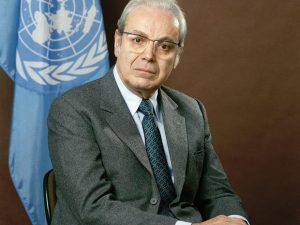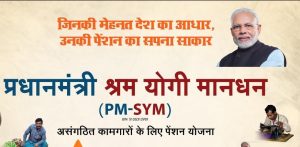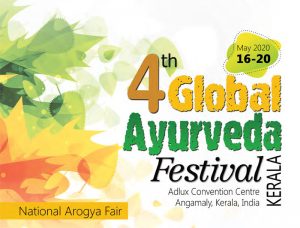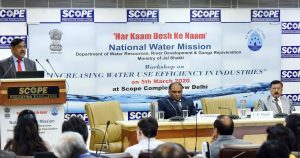 Former UN Chief Javier Perez de Cuellar has passed away at the age of 100. He served as the president of the UN Security Council from 1973 to 1974. He has also served as United Nations Secretary General from 1981 to 1991. He notably led the world body during the Iran-Iraq war and the civil war in El Salvador. He was often described as a “pacifist by vocation and nature.” Javier Perez de Cuellar was born on 19th January 1920 in Lima Peru. He was awarded with the Prince of Asturias Prize for the promotion of Ibero-American cooperation in 1987 and also with the Jawaharlal Nehru Award for International Understanding. Former UN Chief Javier Perez de Cuellar has passed away at the age of 100. He served as the president of the UN Security Council from 1973 to 1974. He has also served as United Nations Secretary General from 1981 to 1991. He notably led the world body during the Iran-Iraq war and the civil war in El Salvador. He was often described as a “pacifist by vocation and nature.” Javier Perez de Cuellar was born on 19th January 1920 in Lima Peru. He was awarded with the Prince of Asturias Prize for the promotion of Ibero-American cooperation in 1987 and also with the Jawaharlal Nehru Award for International Understanding. |
 Google Cloud announced its plans to open a Delhi Cloud Region. This will be the company’s second cloud region in India since it launched one in Mumbai three years ago in 2017. The new cloud region will expand Google’s existing network which stands at 8 regions in the Asia Pacific and 22 regions globally. Google cloud regions bring Google Cloud Platform services to global organisations in industries like media and entertainment, retail and manufacturing. The Delhi cloud region will have three zones to protect against service disruptions. The project to be launched in 2021. In combination with the existing Mumbai cloud region Mumbai, it will also enable in-country disaster recovery for the customers’ mission-critical applications. Google Cloud announced its plans to open a Delhi Cloud Region. This will be the company’s second cloud region in India since it launched one in Mumbai three years ago in 2017. The new cloud region will expand Google’s existing network which stands at 8 regions in the Asia Pacific and 22 regions globally. Google cloud regions bring Google Cloud Platform services to global organisations in industries like media and entertainment, retail and manufacturing. The Delhi cloud region will have three zones to protect against service disruptions. The project to be launched in 2021. In combination with the existing Mumbai cloud region Mumbai, it will also enable in-country disaster recovery for the customers’ mission-critical applications. |
 Global sports brand PUMA has signed bollywood actor Kareena Kapoor Khan as its new brand ambassador. She will be the face of the sports brand for its studio Collection which involves a low-intensity training apparel collection for yoga, barre and pilates workouts. The collaboration of the bollywood actress aims to encourage more women to lead a fit and healthy lifestyle. Puma is a german sportswear brand which is popular for its design and performance of its footwear, apparel and accessories. It provides performance and sport-inspired lifestyle products in various games ranging from football, running and training, basketball, golf to motorsports. Global sports brand PUMA has signed bollywood actor Kareena Kapoor Khan as its new brand ambassador. She will be the face of the sports brand for its studio Collection which involves a low-intensity training apparel collection for yoga, barre and pilates workouts. The collaboration of the bollywood actress aims to encourage more women to lead a fit and healthy lifestyle. Puma is a german sportswear brand which is popular for its design and performance of its footwear, apparel and accessories. It provides performance and sport-inspired lifestyle products in various games ranging from football, running and training, basketball, golf to motorsports. |
 The District Employment and Counseling Centre has organized a Workshop-cum-Awareness Programme on the Skill Development for Unorganized Workers. Awareness workshop for the unorganized workers was organized under the Pradhan Mantri Shram Yogi Maandhan (PMSYM) Scheme. The workshop was held in Kulgam, Jammu & Kashmir. The participants were made aware of the various pension schemes run by the government such as Pradhan Mantri Shram Yogi Mandhan (PM- SYM) and Pradhan Mantri Laghu Vyapari Mandhan (Karam Yogi) Pension Yojana (PM-LVMY). The District Employment and Counseling Centre has organized a Workshop-cum-Awareness Programme on the Skill Development for Unorganized Workers. Awareness workshop for the unorganized workers was organized under the Pradhan Mantri Shram Yogi Maandhan (PMSYM) Scheme. The workshop was held in Kulgam, Jammu & Kashmir. The participants were made aware of the various pension schemes run by the government such as Pradhan Mantri Shram Yogi Mandhan (PM- SYM) and Pradhan Mantri Laghu Vyapari Mandhan (Karam Yogi) Pension Yojana (PM-LVMY). |
 The 4th Global Ayurveda Festival will be held at Kochi, Kerala from 16th to 20th May. The theme of the event is Ayurveda Medical Tourism: Actualizing India’s credibility. GAF2020 is being organised by the Centre for Innovation in Science and Social Action (CISSA). It will be the largest Ayurvedic event ever to be held anywhere across the world. More than 500 stalls, the participation of over 5,000 international delegates, ethnic food carnivals, the exhibition of rich medicinal plants and workshops on Panchkarma to be the key highlights of GAF-2020. Ayurveda Tourist Centres and Spas giving rejuvenation therapy and their potential curative aspects will be showcased. GAF-2020 will bring together the world of Ayurveda wellness providers and it’s seekers to one platform. The 4th Global Ayurveda Festival will be held at Kochi, Kerala from 16th to 20th May. The theme of the event is Ayurveda Medical Tourism: Actualizing India’s credibility. GAF2020 is being organised by the Centre for Innovation in Science and Social Action (CISSA). It will be the largest Ayurvedic event ever to be held anywhere across the world. More than 500 stalls, the participation of over 5,000 international delegates, ethnic food carnivals, the exhibition of rich medicinal plants and workshops on Panchkarma to be the key highlights of GAF-2020. Ayurveda Tourist Centres and Spas giving rejuvenation therapy and their potential curative aspects will be showcased. GAF-2020 will bring together the world of Ayurveda wellness providers and it’s seekers to one platform. |
 On March 6, 2020, the Lok Sabha passed Mineral Laws (Amendment) bill, 2020. The bill aims to amend Mines and Minerals (Development and Regulation) act, 1957 and also Coal Mines (Special Provisions) Act, 2015. On March 6, 2020, the Lok Sabha passed Mineral Laws (Amendment) bill, 2020. The bill aims to amend Mines and Minerals (Development and Regulation) act, 1957 and also Coal Mines (Special Provisions) Act, 2015. |
|
|
|
 On March 6, 2020, the Jammu airport security was taken over by the Central Industrial Security Force (CISF). With this there are 63 airports under CISF at present. On March 6, 2020, the Jammu airport security was taken over by the Central Industrial Security Force (CISF). With this there are 63 airports under CISF at present. |
|
|
 During India’s Smart Utility Week, India and European Union called upon Integrated Local Energy System. The countries are to work upon clean energy and climate. The collaboration will help to improvise clean energy supply During India’s Smart Utility Week, India and European Union called upon Integrated Local Energy System. The countries are to work upon clean energy and climate. The collaboration will help to improvise clean energy supply |
|
|
|
 On March 5, 2020, the Department of Science of Technology operating under Ministry of Science and Technology organized an International Conference on Nano-Science and Nano Technology (ICONSAT) at Kolkata. The Conference is to be held between March 5, 2020 and March 7, 2020. On March 5, 2020, the Department of Science of Technology operating under Ministry of Science and Technology organized an International Conference on Nano-Science and Nano Technology (ICONSAT) at Kolkata. The Conference is to be held between March 5, 2020 and March 7, 2020. |
|
|
 The National Water Mission organized the inaugural session of the workshop on “Increasing Water Use Efficiency in Industries”. The workshop on “Increasing Water Use Efficiency in Industries” was held in New Delhi. The National Water Mission organized the workshop under the initiative “HarKaamDeshkeNaam”. During the workshop, U.P. Singh, the Secretary, Department of Water Resources, River Development & Ganga Rejuvenation emphasized on the adoption of the Corporate Water Responsibility (CWR) as part of the Corporate Social Responsibility (CSR) provisions. He also stated that India is drawing 2.5 times more ground water than what seeps down under to maintain the water table level an this is the key reason we are facing the water scarcity. The National Water Mission organized the inaugural session of the workshop on “Increasing Water Use Efficiency in Industries”. The workshop on “Increasing Water Use Efficiency in Industries” was held in New Delhi. The National Water Mission organized the workshop under the initiative “HarKaamDeshkeNaam”. During the workshop, U.P. Singh, the Secretary, Department of Water Resources, River Development & Ganga Rejuvenation emphasized on the adoption of the Corporate Water Responsibility (CWR) as part of the Corporate Social Responsibility (CSR) provisions. He also stated that India is drawing 2.5 times more ground water than what seeps down under to maintain the water table level an this is the key reason we are facing the water scarcity. |
You need to login to perform this action.
You will be redirected in
3 sec
